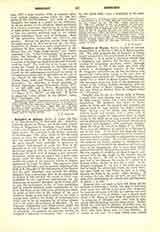

Benedict of Aniane, Saint, b. about 745-750; d. at Cornelimunster, February 11, 821. Benedict, originally known as Witiza, son of the Goth, Aigulf, Count of Maguelone in Southern France, was educated at the Frankish court of Pepin, and entered the royal service. He took part in the Italian campaign of Charlemagne (773), after which he left his royal master to enter the religious life, and was received into the monastery of St. Sequanus (Saint-Seine). He gave himself most zealously to practices of asceticism, and learned to value the Rule of St. Benedict as the best foundation for the monastic life. Returning home in 779, he established on his own land near the little river of Aniane a new monastic settlement, which soon developed into a great monastery, uuder the name of Aniane, and became the model and center of the monastic reform in France, introduced by Louis the Pious. The emperor’s chief adviser was Benedict, and the general adoption of the Rule of St. Benedict in the monasteries of the Empire was the most important step towards the reform. Benedict took a prominent part in the synods held in Aachen in 816 and 817, the results of which were embodied in the important prescriptions for the restoration of monastic discipline, dated July 10, 817; he was the enthusiastic leader of these assemblies, and he himself reformed many monasteries on the lines laid down in the ordinances promulgated there. In order to have him in the vicinity of his royal residence, Louis in 814 had founded on the Inde, a stream near Aachen, the Abbey of Cornelimunster, which was to be an exemplar for all other abbeys, and to be under the guidance of Benedict. In the dogmatic controversy over Adoptianism, under the leadership of Felix of Urgel, Benedict took the part of orthodoxy. To promote the monastic reforms, he compiled a collection of monastic rules. A pupil of his, the monk Ardo, wrote a biography of the great abbot.
J. P. KIRSCH

